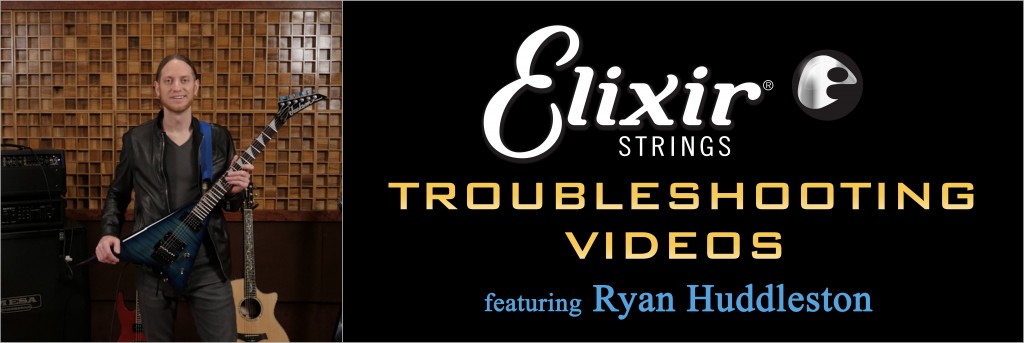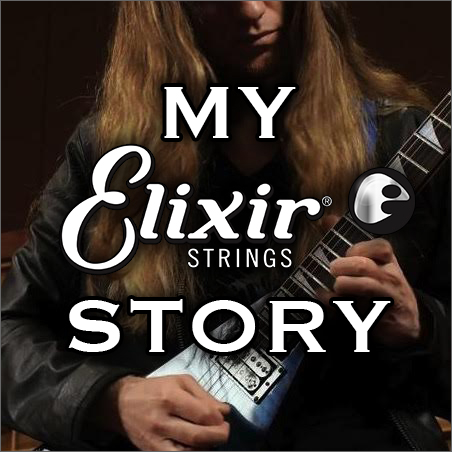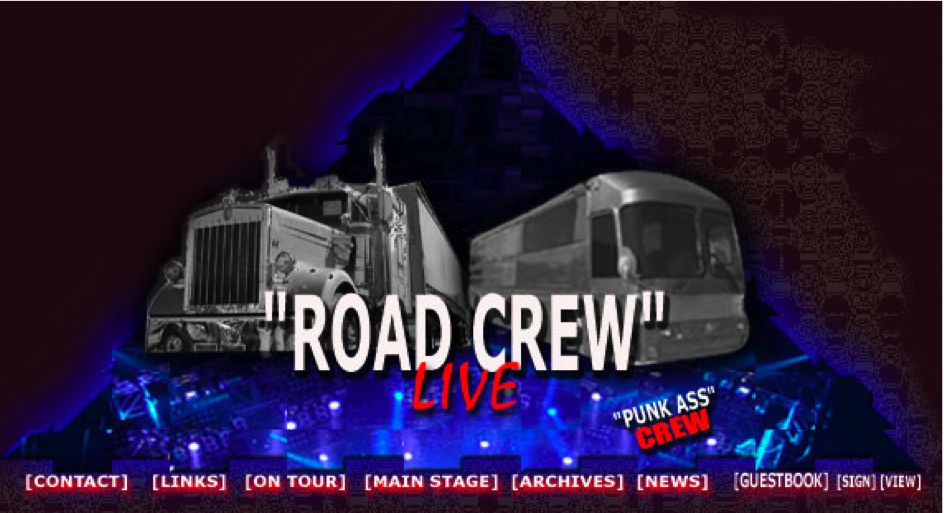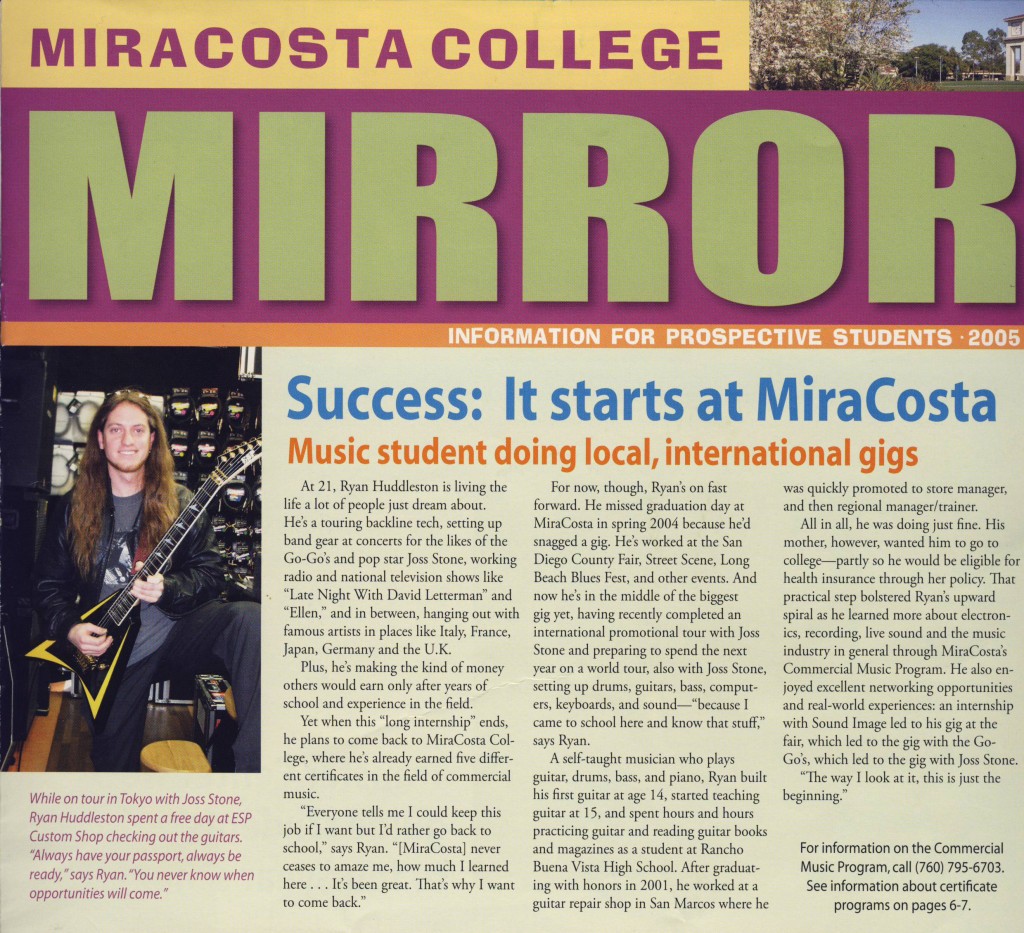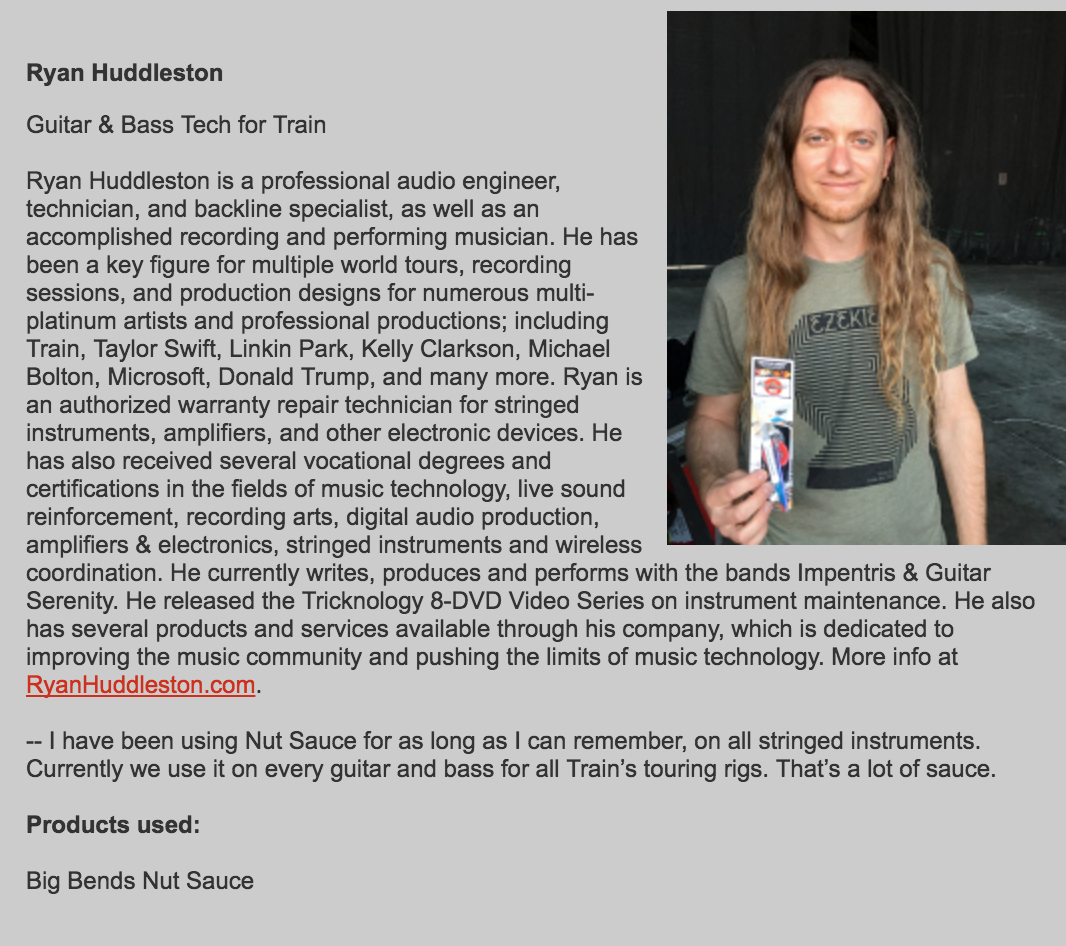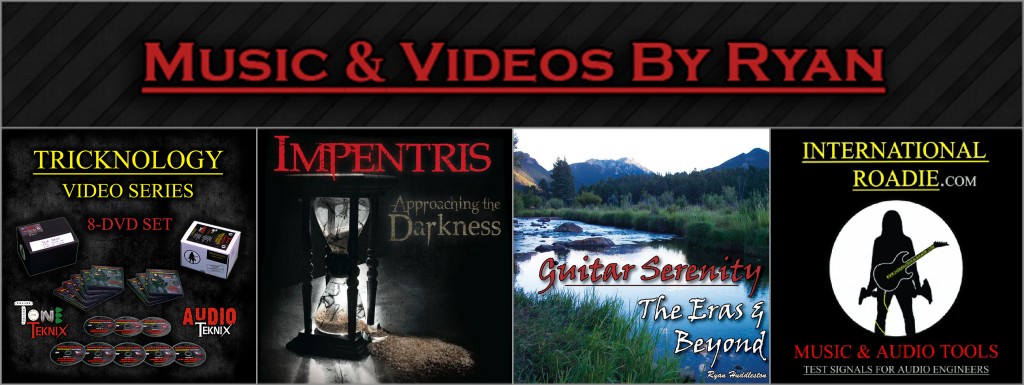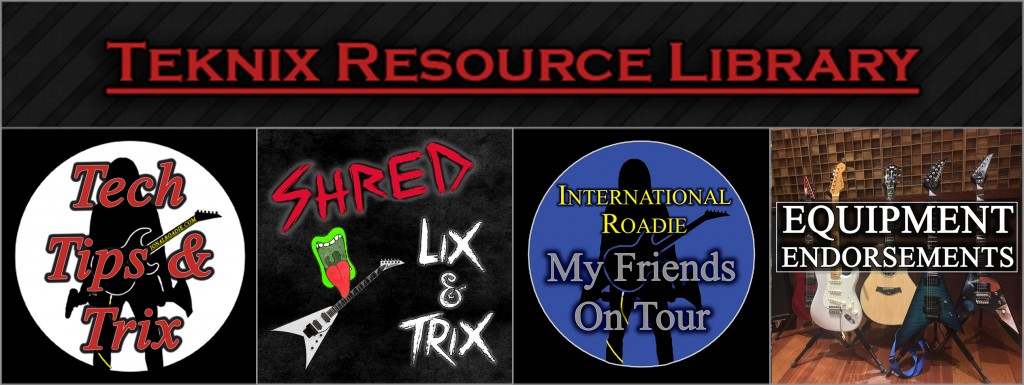
Teknix Concepts & Ryan Huddleston– In The Press… Read the interviews by others who have interviewed me, the International Roadie.
![]()
Elixir Strings Guitar Tech Troubleshooting Video Series, featuring Ryan Huddleston. Learn the secrets of a professional guitar technician, so you can quickly troubleshoot and prevent technical difficulties, such as Staying in Tune, Noise & Crackle, String Buzz, and No Volume. Get your gear optimized for performance, so you can take the stage, or hit the studio, like a pro!
INTERNATIONAL ROADIE: A HUMAN SWISS ARMY KNIFE
by Elixir Strings
Some of the biggest names in the music industry entrust Ryan Huddleston with their sound. From pop superstar Taylor Swift and rock icons Train, to multiplatinum metal band Avenged Sevenfold, Ryan has worked with every style, on every level, providing a multitude of services.
“I’ve been told I’m a human Swiss Army knife,” Ryan laughs – but it’s no joke. Among other jobs, Ryan has worked as a guitar and drum tech, backline specialist, front-of-house engineer, computer technician, recording engineer and stage manager. And before he started touring as an international roadie, Ryan was employed in one of the biggest certified guitar repair shops in the U.S., working on as many as 100 instruments and amplifiers a week! Ryan has also released his own instructional DVDs titled “The Tricknology Video Series,” which teach a variety of skills for aspiring audio engineers and backline technicians. So when it comes to helping musicians sound their best, Ryan Huddleston knows what he’s talking about.
How did you develop so many diverse music tech skills?
My dad owned a music store when I was a kid, so I was exposed early on to music, bands and recording studios. Around 13, I tried to change the pickup in my guitar and got some solder in my eye. Right then I realized, “There’s got to be a better way of doing this!” So I started reading books and magazines and asking musicians about what they knew.
Then I began learning as much as I could about being in a band, maintaining my gear, using the PA system, et cetera. All that blossomed around the time I hit college. I went to Miracosta College, where they have a huge music facility, great teachers and vast resources. I ended up completing six different degree programs there: I studied recording arts, live sound, stage performance, digital audio, stagecraft, business, a little bit of everything.
At the same time that I was going to school, I was also working in a music store doing guitar repair. So I was getting “real-life” experience as well as the college experience.
Later, around 2004, right out of school, I got hired as a drum tech for The Go-Go’s. One day I heard the guitar tech say, “We need to send these guitar amps in to get rebiased.” I said, “I can do that, I have the tools in my car.” Everyone was surprised. I said, “Doesn’t every guitar tech know how to bias an amp?” They told me flatly, “No.” Being only 21, I didn’t realize how sharp my skills were. After that, I just kept getting hired by bands for a variety of jobs, whatever anyone needed.
Was it then, as a roadie, that you started using Elixir® Strings?
Before I started working with big name, touring artists, when I was working at String Masters, my job every Saturday was to restring twenty-fifty guitars! And I always loved using Elixir Strings. So I fell in love with Elixir Strings before I was even touring.
Later, after my first tour with Green Day, The Go-Go’s management liked me so much they hired me to work with Joss Stone. Joss and her guitarist David Gilmore (a jazz player from Brooklyn) had a great relationship with Elixir Strings, so I forged a personal relationship through them. Now, here I am, years later, and I’m still using Elixir Strings.
Making that connection early on was a huge benefit because, for one, they’re incredible strings – they do everything they’re supposed to – and two, having the support and the service of the company – getting what I needed in time – it’s just so critical. Nobody wants to hear excuses from a guitar tech, so it’s nice to deliver what’s expected. Elixir Strings make my job so much easier, I never have to struggle.
What specifically is it about Elixir Strings that makes your job easier?
So many things, for instance: The tone is great, they stay in tune and since Elixir Strings are coated they are protected from sweat and debris buildup – they really hold up and don’t suffer the typical problems of other strings. Also, I’ve never seen Elixir Strings rust. Every other string tends to rust with time or from an excessively sweaty player. And then that rust affects your frets; it puts rust on your pickup coil, the magnet poles; it affects the bridge. So not having to deal with rust is a huge lifesaver. It actually makes your instrument last longer – let alone your strings.
Tell me about your experiences with Elixir Strings when it comes to live performance versus studio recording.
I’ve done tons of mobile recordings with artists, Taylor Swift, Kelly Clarkson and on and on. So field recording, studio recording, live recording, I have my hands in all of that. Across the board, Elixir Strings always sound great, with a microphone or coming out of a quarter-inch jack, on all levels they’re a ten – it’s what I aim for.
I do backline and I do front-of-house audio, so I learned early on that you can’t get good sound if you don’t have good equipment. This includes the smallest details. If you have bad guitar strings, you’re never going to get a good recording. Elixir Strings always perform.
And how many of the artists that you work with use Elixir Strings?
I would say close to one hundred percent. I have even dealt with guitar players who had deals with other string companies, and I always recommend they try Elixir Strings. Even if they’re skeptical, once they try Elixir Strings they say, “Wow! These feel great and sound incredible!”
Ultimate Ears University – by Mike Dias
Have you ever thought about all the people that it takes to run a successful tour? Let’s just think about it from an audio perspective for a second. Live sound reinforcement is much more than just the audio engineer. To give us a better understanding of some of the other audio technician roles, we caught up with Ryan Huddleston, International Roadie for Michael Bolton and others.
Besides for sharing some of his tips & tricks with us directly, Ryan will be telling us about a new teaching video series that he just released.
Hey there Ryan – thank you for talking with us today. I know how busy you are. Speaking of which, who are you out with now and what are you doing for them?
Hey Mike, thanks for having me. Yes, life does get busy, especially working for Michael Bolton. It’s been about 3 years with him now and I’ve probably been to some 50 countries or so since. It’s a crazy schedule! I’m responsible for maintaining, programming, and operating all the computers, synthesizers, keyboards, and related video & MIDI equipment. As well as overseeing the horn section, the piano, some stage props, and just helping anywhere I can.
Actually, this brings up an interesting point that I’ve been meaning to call attention to. To date, we’ve only profiled monitor engineers and front of house engineers but in reality, there is a whole team of technicians that are responsible for how a band sounds. I know that you have plenty of time behind the desk, but you’ve also had your hands on so much more. Since you have such a diverse technical background, can you please help educate us on what exactly each role is responsible for. Let’s start with computer technician. What is that exactly? What’s a typical night look like?
I guess a computer technician would be somebody who makes sure the computer turns on and does what it’s supposed to. Which can be exciting sometimes, after all the international gear shipments. As well as operating and programming related software for audio, backline, video, photoshop, pro tools, fixing Internet problems, plus maintaining all the operating systems, plug ins, drives, hardware, etc.
How about a Pro Tools engineer and operator?
I wish it was as simple as putting a microphone in front of an instrument and hitting the record button, but it often requires much more attention. After the performance is recorded it needs to be mixed, edited and formatted to deliver to the various outlets. Such as radio, T.V., Youtube, DVD, or live playback. The most common though is playback, which is kinda like the nervous system of the production. This would include click tracks for the band and conductor, printed sound effects, cues, MIDI data & program changes, and more.
What about a Backline Programming Specialist?
Backline is the music equipment behind the band, but there’s more than just guitars & drums these days. I spend a lot of time poking around the menus & utilities on a lot of digital equipment, often on days off or at the last second before a show. Finding my way around keyboards, drum machines, synthesizers, various software and third party software programs, pedal boards, MIDI configurations, synchronizing integrated systems & backups, and anything else that needs programming or reconfiguring.
Oh man — that’s a lot more work than we normally think about. So you’ve mixed sound for bands but you’ve also been an audio engineer for lecture seminars. You’ve worked for Tony Robbins, Robert Kiyosaki, Suzi Orman, and George Foreman just to drop a few names. I’m so curious about this. How is mixing this type of audio format different than mixing for a big rock show?
Sound for public speaking is a totally different approach from Rock & Roll. Different techniques are needed when you only have one source to reinforce. When there’s a whole band its easy to pick out your favorite or least favorite tones and mix around them or with them. But with speaking you have to get a little more hands on with your mix; stacking parametric EQs and even graphic EQs sometimes on one microphone just to get it to sound good & avoid problems. Plus, those shows can last 14-18 hours sometimes, which can be exhausting. Especially when each presenter has a different timbre to their voice and speaks for only a few moments, so by the time the mix is perfect you get to start all over again.
And I have to ask – which type of gig is easier?
I definitely prefer music, and find it easier to get through the gig without falling asleep on the spacebar. Technically speaking, none of them are that difficult, it’s often the psychology that can get tricky. Flipping mind sets from talking to a billionaire CEO or a famous Rock Star right into loading a truck with a 300-pound New Yorker can be challenging, especially if you haven’t had decent sleep from all the traveling.
By the way, how did you land such an amazing gig anyways?
Somebody once told me preparation and opportunity equals success. So I’ve spent most of my life preparing for opportunities, a lot of hard work and a lot of luck has led me on an amazing journey. I was kinda born into music and have always surrounded myself with instruments. The week I turned 21, I graduated college with 5 degrees, landed my first international tour with Joss Stone, and got a taste of the sweet and bitter life of Rock & Roll touring, that I just can’t let go of. Plus it helps that people like me enough to rehire me and recommend me to their peers.
OK. so switching topics slightly. Now you and I have known each other for years so I know that you’re going to be to humble and not bring up your new project, but I want to talk about it because you’ve done something truly amazing. You’ve amassed over 10 years of field knowledge into an educational video series. Basically, you teach anyone how to become an International Roadie. Can you please tell us about your new Tricknology video series?
The Tricknology video series is 8 DVDs of 1-on-1 instruction, showcasing many industry standards and procedures practiced by most touring professionals. It includes step-by-step instructions for guitar & bass setups, tube amp & guitar repairs, cable building & soldering, speaker maintenance & troubleshooting, and so much more. I’m so excited to finally share it with the public. After training thousands of industry pros around the world, I formulated a complete course for teaching anyone of any skill set how to steal my job as an International Roadie. The videos also teach anyone how to get their gear sounding and playing better with some great “trix” I’ve picked up on tour, in the shop, and in the studio.
How long did this take to put together? This is fairly monumental especially considering the fact that you’ve always been working on top billing international tours. When did you even find time to do this?
It’s not hard to make time to do what I love. I often work on my many projects on planes, in hotel rooms, backstage on down time, and while at home. As you know, the touring industry doesn’t work everyday of the year, so I spend every free minute working on my own music projects & chasing my own dreams. Plus, I couldn’t have done it without the help of my amazing team, and all the support from my friends, family, and fans.
So last question, but I have to ask. Why? Why did you share all your secrets? Most people really keep their tips and tricks to themselves.
Well I have a lot of tips & trix, and it seems logical to share it with the music community so that we can grow stronger together. I even created a blog to supplement the video series, which is loaded with tips, trix, stories, music, videos, and more. It’s free too! International Roadie.com.
You never know what, or who, I might find next…
Thank you Ryan – see you on the road!
Ryan Huddleston is a professional audio engineer, technician, and backline specialist, as well as an accomplished recording and performing musician. He has been a key figure for multiple world tours, recording sessions, and production designs for numerous multi-platinum artists and professional productions; including Linkin Park, Kelly Clarkson, Michael Bolton, Joss Stone, Microsoft, and many more. Ryan is an authorized warranty repair technician for stringed instruments, amplifiers, and other electronic devices. He has also received several vocational degrees and certifications in the fields of music technology, live sound reinforcement, recording arts, digital audio production, amplifiers & electronics, stringed instruments, and wireless coordination.
UE University is committed to showcasing monthly interviews with prominent audio technicians. Read these ongoing articles and learn tips and tricks from the pros.
1. Ryan…how old are you and how long have you been a professional crew personality?
-I am 22. I have been a touring tech for just over a year now. I spent a few years in a repair shop, String Masters Custom Shop in San Diego, as a senior technician of stringed instruments and electronics. I also have completed six college Degrees/Certificates from MiraCosta College in the San Diego area. Recording Arts, Live Sound Reinforcement, Computerized Audio, Digital Audio, Performance Technician, and Music Technology. I like to believe that those attributes give me an advantage, but I think the real experience comes from the fact that my father is a musician. He owned a small chain of music stores in Oregon, Pro Show Music and Sound, when I was young. My whole life has been spent encompassed in a world of music as a musician, tech, and fan.
2. Do you ever get attitude from the big boys in the crew industry?
-All the time, especially when I first started. I think I have sort of proven my capabilities now, which is cool because I am developing a reputation as being highly competent among those “non-believers.” I remember there being many so-called veteran pros brought in to “show me the ropes,” most of which I was amazed they were ever employed in the first place. I was very lucky to have been an apprentice learning from some of the best in the industry all throughout my career so far. Both my father and Paule at String Masters are amazing luthiers. A man named Kevin Carey, an unbelievable Audio Engineer and professional, was my mentor for many years. Plus when I started as a backline tech I went straight to the top, so there were no bad habits learned. So I guess I could say that I have received tons of shit from the vets, but I get considerably more positive energy than negative. I have been taken under the wings of some great people so far, and I feel extremely privileged to be able to work with many legends in the industry.
3. I see you are a long hair and we at RCL love that you continue the good tradition of the locks. Who influenced you to grow your hair? Not your mother I’m sure.
-That’s funny you mention that. My mother used to say that my hair could never be longer than hers, but she is understanding and supportive of everything I do and always helped me to accomplish my dreams. From age thirteen, when I really decided what I wanted to do with my life, she did nothing but support me. I believe that long hair is a bold statement of who you are and how you feel on the inside as well. I am proud to show off my locks any time. I was in a band Impentris, for about five yeas we all had long hair. There was no band like us anywhere.
4. Tell us what part of working with little Diva Joss Stone you enjoy best?
-We do all the kick ass shows! The Grammys, The Brits, Live 8! I love my job! I meet so many great people, that I feel I can really relate to. Joss is so amazing! I get to hang with her regularly, she is so down to earth. It’s funny that no matter how many gigs I have done with her in the last year, I seem to get the chills every show, multiple times. I love to be witness to world class musicians every day too. As a musician I, I love to watch and listen to the beautiful music simply pour from these incredible artists. Although I am primarily a String and Keys tech, my favorite role in backline is working with the drums. I love to play in an open venue and just rock out! When not working on my guitar domination, I am usually working on my drumming skills.
5. Guitar teching is your thing. What new school guitar gear have you discovered that makes your gig easier such as tuners…cables etc.
-I am not too fond of most gear these days. I tend to build most cables myself to know their exact quality. I don’t even use a tuner to intonate a guitar. Sometimes I even surprise myself by tuning guitars perfectly to pitch without tuners, just to get better at relative pitch. But I do have many little tricks up my sleeve to help me find problems before they occur. I have bitchin’ tube testing equipment and great little trouble shooting gadgets to make life that much less “Murphied.” I am also very happy to be using the best gear in the industry right now. But my best tool is experience at the repair shop with lots of broken gear. I am never afraid to dive right into a blown amp or broken headstock. I have a full tech workbox of “auto -magic tricknological” surprises to save almost any disaster.
6. You are quite the brilliant kid. You work on guitars and amps as well as tech. Tell us some recent modifications you have made to an amp to make it rock harder without giving away any secrets. Which make of amp.
-I have done FX loops, pre-amp boosts, EQ mods, Filter cap and bias services, reverb installs, speaker cab reinforcement, power tube change mods, and more on various amps. I probably spent the most time working on Fender equipment because they are a huge manufacturer with tons of gear and I was an authorized repair tech for a while, so I spent lots of time on the phone with them and reading their manuals to learn all the ins and outs. A buddy of mine scored an old JCM 800 combo a while ago, that was probably the coolest soup-up I have done yet on one amp all at once. We threw in some JBL speakers, replaced all the filter caps, redid the bias section, and did a mod to the power tube bias section, to run 6550s instead of EL34s. Put in all new Ruby tubes, and the difference was night and day. It went from a typical vintage amp to a hot rod, balls out, crushing machine.
7. Which guitar and amp together is your fav choice and why?
-I don’t know how to answer that one… I play a Crate Blue Voodoo with a Jackson guitar, looking to potentially go to Mesa and ESP. I think ESP and Gibson are some of the most well made instruments you can find. The best could very well be a custom axe, which can be any way to be desired. I love to pick one up and just observe it. I can tell so much about an axe by its first impression alone. I remember my father built this guitar out of Koa wood from Hawaii, it sounds unbelievable. There are so many great amps, and other pieces of gear as well. I am still developing an arsenal, at nearly 20 stringed instrument and 10 amps so far. But I usually go for a sound that is raunchy and brutal, since I play in a heavy metal band. Then again I love so many styles of music I can’t even leave my guitars away from me when on the road, so I can practice as much as possible.
8. Tell us at age 22 what all your talents are as a tech and overall music industry talents you have. Big boys may want to take notice of this punk ass.
-I can learn. I can listen. I can work with others. I am willing to look at things with an open attitude, constantly seeking a more efficient way of doing everything. Plus I am “still” stoked to be here, in the middle of it all. I am not very easily discouraged either. I will troubleshoot anything until I find the problem. I do carry spares when I can, but because we were for so long on a low budget I had to fix things when they broke. So far I have never had any fatal problems on a gig, but before the band would arrive I would always be jumping through hoops. One time my main and spare bass amp were broken right off the rental truck on a one off with no tools, but that did not stop me. I took them both apart and salvaged the easier one, and left the other for the shop guy after finding the problem anyway. It’s too bad I am so nice, I should have billed my regular bench rate of $65/hour, but it only took 5 minutes, so…I’m over it.
9. Do you feel privileged to have this awesome job as opposed to working in the Motors in …lets say Detroit Rock City.
-Hell yes! I think the worst job I had was working at Blockbuster video for like 3 weeks, which wasn’t too bad at all. I also worked as a private teacher for nearly ten years, but I loved it. I worked for an independent production company in high school, in between all my hockey endorsements. I actually spent 2 months living in Michigan, but I sure didn’t get a job there, mostly just played guitar and hockey. Then my house burned down in San Diego, so I had to get my life together fast. Hence Blockbuster, then the guitar shop. I am extremely privileged to be where I am. I don’t forget that. I never really had to deal with too bad of a job, thank god. I was however doing the sound guy thing at clubs before I could even go to strip clubs. Those were some of the most depressing times, having to deal with local idiots with big heads.
10. You are the first to open up the Punk Ass Crew, and well disserved son. You can now plug any and all acts or sites you wish on RoadCrewLive.com. God Speed to ya mate and a fine job on the ole RCL.
-Thank You So Much!! It has been a pleasure and honor to kick start this new concept. I doubt I am the only PUNK ASS out there, but there is no question that I fit that title.
-Check out my music at Impentris.com & Guitar Serenity.com. There are some other cool bands from SD that are my buddies; Jack the Original, Hurizon, Call Me Alice, Agent 22, Calima, Wither, Innocent Noise, Good intentions, Etched in Red, Flight Risk, and some others that I can’t remember.
Darrell DWaRf Millar’s Time Capsule – www.RoadCrewLive.com
At 21, Ryan Huddleston is living the life a lot of people just dream about. He’s a touring backline tech, setting up band gear at concerts for the likes of the Go-Go’s and pop star Joss Stone, working radio and national television shows like “Late Night with David Letterman” and “Ellen,” and in between, hanging out with famous artists in places like Italy, France, Japan, Germany and the U.K.
Plus, he’s making the kind of money others would earn only after years of school and experience in the field.
Yet when his “long internship” ends, he plans to come back to MiraCosta College, where he’s already earned five different certificates in the field of commercial music.
“Everyone tells me I could keep this job if I want but I’d rather go back to school,” says Ryan. “[MiraCosta] never ceases to amaze me, how much I learned here… it’s been great. That’s why I want to come back.”
For now though, Ryan’s on fast-forward. He missed graduation day at MiraCosta in spring 2004 because he’d snagged a gig. He’s worked at the San Diego County Fair, Street Scene, Long Beach Blues Fest, and other events. And now he’s in the middle of the biggest gig yet, having recently completed an international promotional tour with Joss Stone, setting up drums, guitars, bass, computers, keyboards, and sound- “because I came to school here and know that stuff” says Ryan.
A self-taught musician who plays guitar, drums, bass, and piano, Ryan built his first guitar at age 14, started teaching guitar at 15, and spent hours practicing guitar and reading guitar books and magazines as a student at Rancho Buena Vista High School. After graduating with honors in 2001, he worked at a guitar repair shop in San Marcos where he was quickly promoted to store manager and then regional manager & trainer.
All in all, he was doing just fine. His mother, however, wanted him to go to college, partly so he would be eligible for health insurance through her policy. That practical step bolstered Ryan’s upward spiral as he learned more about electronics, recording, live sound, and the music industry in general through MiraCosta’s Commercial Music Program. He also enjoyed excellent networking opportunities and real-world experience: an internship with Sound Image led to his gig at the fair, which led to the gig with the Go-Go’s, which led to the gig with Joss Stone.
“The way I look at it, this is just the beginning.”
Photo Caption: While on tour in Tokyo with Joss Stone, Ryan Huddleston spent a free day at ESP Custom Shop checking out the guitars. “Always have your passport, always be ready,” says Ryan. “You never know when opportunities will come.”
![]()
![]()

Teknix Concepts & Ryan Huddleston– In The Press… Read the interviews by others who have interviewed me, the International Roadie.
![]()
![]()
![]()
![]()
![]()
![]()
![]()
Guitar & Bass tech for train ryan huddleston is a professional audio engineer technician and backline specialist as well as an accomplished recording and performing musician he has been a key figure for multiple world tours recording sessions and production designs for numerous multiplatinum artists and professional productions including train taylor swift linkin park Kelly Clarkson Michael Bolton Microsoft Donald trump and many more. Ryan is an authorized warranty repair technician for strings instruments amplifiers and other electronic devices he has also received several vocational degrees and certifications in the fields of music technology, live sound reinforcement recording arts digital audio production amplifiers electronics stringed instruments wireless coordination he currently writes produces and performs with the bands Impentris guitar serenity he released the Tricknology 8-dvd video series on instrument maintenance he also has several products and services available through his company whish is dedicated to improving the music community and pushing the limits of music technology more info at ryanhuddleston.com I have been using nut sauce for as long as I can remember on all stringed instruments currently we use it on every guitar and bass for all train’s touring rigs. That’s a lot of sauce,. Products used big bends nut sauce
Elixir strings troubleshooting videos with Ryan Huddleston Ryan’s Recent Projects
Teknix Concepts Switchers Guitar Workshops Greatest Guitar Solos of All Time Music Videos by Music & Videos by Ryan Tricknology Video Series 8-DVD Set Tone Teknix Audio Teknix Impentris Approaching the Darkness Guitar Serenity The Eras and Beyond International Roadie Music & Audio Tools Test Signals for Audio Systems
Teknix Resource Library Tips & Trix Shred Lix & Trix My Friends on Tour Equipment Endorsements International Roadie Memiors Follow Ryan Huddleston around the globe to the coolest places on the planet








